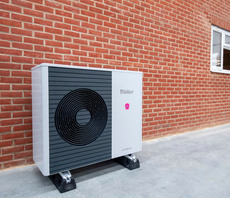Study: Heat pumps could slash UK buildings’ energy demand by 40 per cent


New report examines economic gains which could be realised through mass adoption of heat pumps to drive the decarbonisation of residential heat
Mass heat pump deployment could reduce energy demand across the UK’s residential building stock by up to 40 per cent and result in annual household savings of £15.9bn, a new report has argued.
According to a new study from the UK Energy Research Centre (UKERC), titled Unlocking the Efficiency Gains of Heat Pumps: The Role of Electricity and Gas Prices, the efficiency gains heat pumps enjoy over gas heating systems are so pronounced they could result in a huge reduction in lead to important energy demand reduction across the residential sector.
However, the authors of the report – Karen Turner, Antonios Katris, Christian Calvillo, Jamie Stewart and Long Zhou – warned that under prevailing market conditions where the retail price of electricity is high relative to gas, the bills saving and wider economic benefits usually associated with substantial energy efficiency increases are not as evident as they should be.
The report analysed a simulated scenario where almost 50 per cent of households use low carbon heating by 2035 and nearly all do so by 2050, with heat pumps emerging as the dominant heating option.
Under the scenario the improved energy efficiency of heat pumps – which are around three times more efficient than gas boilers – led to an almost 40 per cent reduction in energy demand by 2050 compared to a base case where the energy use for residential heating largely remains unchanged without additional decarbonisation measures.
The authors also argued that unlocking the efficiency gains of heat pumps could lead to a range of wider economic benefits through the reallocation of real income and spending as a result of lower energy bills.
Considering a hypothetical price parity of 1:1 between electricity and gas, energy efficiency gains are fully realised and could result in an average increase of £300 a year for the 20 per cent of households on the lowest incomes, and over the £770 a year for the 20 per cent of households on the highest incomes, the report estimated.
The report then suggested that this extra disposable income could lead to a sustained increase in total UK household consumption of around 1.2 per cent, amounting to around £15.9bn overall.
The authors estimated that this increase in household demand would drive sustained GDP gains of 0.2 per cent – or £3.8bn – in the long run and could lead to the net creation of around 67,245 full-time equivalent (FTE) jobs across different sectors of the economy.
The report also challenges the notion that under existing market arrangements heat pumps can be more expensive to run that gas boilers.
It notes that historically electricity has been more expensive than gas, which erodes the effect the energy savings from using heat pumps can have on households’ energy bills, real income gain, and spending power.
The analysis suggests that the breakeven point in the price difference ratio of electricity to gas is 3.4:1. Where the ratio is greater than this, the use of heat pumps is found to be more expensive than the use of gas boilers with the implication that with no other changes or interventions in the economy, real incomes and spending power will fall and contractionary pressures will be triggered across the economy.
As such, the report said the report highlights the importance of a “broader rethink” around how to address not only the absolute size of domestic energy bills, but also the relative prices of electricity and gas.
A potential net zero strategy focus on electrification could require that electricity becomes comparably less expensive than the current dominant heating fuel which is gas, the report agued. The authors went on to suggest that this analysis could deliver insight supporting electrification in other contexts, such as remote areas where households currently choose other heating options over electrified ones.
Significantly, the government sought to act on at least some of the report’s recommendations through its ‘Green Day’ package of announcements last week.
Most notably, the government confirmed plans to shift more of the levies on electricity on to gas – a move that should shift the cost ratio between electricity and gas in a way that makes heat pumps more financially attractive.
The government also announced a new Heat Pump Investment Accelerator funding scheme which it is backing with £30m and an aim to leverage a further £270m of private sector investment to boost the manufacture and supply of heat pumps in the UK.
And it unveiled plans to implement a new market mechanism for heat pumps from next year with a view to incentivising heating system manufacturers to deploy more heat pumps and reduce their share of gas boiler sales.
Minister also confirmed the government’s Boiler Upgrade Scheme is be extended to 2028 in a move that should make it easier for more households to access heat pump grants worth up to £5,000.
The moves were broadly welcomed by green groups, but experts also warned more action was needed to deliver on the government’s goals to install 600,000 heat pumps a year by 2028 and phase out new gas boilers by 2035.








